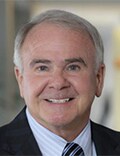En atención a la creciente preocupación sobre la confianza en...
Leer más
Pandemic Lessons: Rebuild Trust, Stop Misinformation, AMA Prez Says


Dr Gerald E. Harmon
Looking beyond the COVID-19 pandemic, Gerald E. Harmon, MD, president of the American Medical Association (AMA), on Thursday called for five actions to “fix our ailing health system, rebuild trust [in science and experts], and better respond to the next public health emergency.”
Speaking at the National Press Club in Washington, DC, Harmon said that the first action should be to “enhance our state and federal stockpiles of medically necessary supplies and improve the system for acquiring and distributing them.”
The shortage of personal protective equipment (PPE) and other essential supplies in the early phase of the pandemic slowed the nation’s response and needlessly put the lives of physicians and frontline workers at risk, he said.
Second, Harmon said, “We must significantly increase funding to bolster our nation’s diminished public health infrastructure. Chronic disinvestment in government public health agencies puts lives at risk and has severely limited our ability to fight COVID-19. State public health spending has dropped 16 percent over the last decade, resulting in the loss of nearly 40,000 jobs in state and local public health agencies.”
Third, he said, we should learn from the process that led to the rapid development, testing, and production of several safe and highly effective COVID-19 vaccines. He lauded the public-private partnership and structure of Operation Warp Speed and said its blueprint should be preserved for future public health emergencies.
Fourth, he called for Congress to make permanent the rule changes and coverage expansions that have supported the enormous expansion of telehealth and remote patient care during the pandemic. “For the rest of this pandemic and beyond, Medicare patients must retain the ability to access telehealth services from their doctors without arbitrary restrictions,” he said.
Finally, Harmon commended Congress for passing the Health Care Provider Protection Act, which he said “will raise public awareness of the mental health needs of physicians and dedicate federal resources to create evidence-based programs” to serve them.
Explaining why this is so important, he spoke of the extraordinary pressure on frontline physicians and healthcare workers during the pandemic and of their commitment to serving sick patients. He also decried the violence and intimidation they have encountered in some work situations.
“We owe physicians and health care workers much more than our love and appreciation,” Harmon said. “We owe them our most sincere efforts to fix the problems that have plagued our response to COVID-19…and to work with them to solve common frustrations that are driving so many out of the profession.”
“Pandemic of Mistrust”
Harmon spoke at length about the “pandemic of mistrust” — the loss of trust in the advice of experts, including doctors and scientists — that has made the pandemic worse than it had to be.
“It is a major reason why the US has a far higher death rate from COVID-19 than other well-resourced countries,” he said.
One way to begin rebuilding that trust, he said, “is to effectively counter those voices who spread easily disproven and blatantly false information online. Surprising to me, some of the loudest purveyors of misinformation and junk science during this pandemic have been a very small number of doctors and health professionals.”
Noting that these lies by physicians “violate the ethics of our profession,” Harmon called on state medical boards “to respond swiftly when physicians spread falsehoods online and through the media, particularly disinformation relating to COVID-19.”
In the Q&A session after his speech, Harmon was asked whether the physicians who disseminate these falsehoods should lose their medical licenses.
“The AMA doesn’t have to dictate what punitive action or disciplinary action the medical boards should take,” he replied. “It doesn’t have to be so far as losing their license. They might suspend their license for a while or put them on probation. But they have to be held accountable.”
In his speech, Harmon said the AMA also “urges media outlets, including influential social media companies and streaming services, to remain vigilant to help their readers, viewers, and listeners more easily separate fact from fiction and reduce misinformation.”
Government’s Pandemic Missteps
Harmon criticized the Trump and Biden administrations for “numerous and well-documented missteps prior to and since the start of the pandemic that have understandably contributed to this environment of distrust.”
Among them are:
- Inadequate funding of pandemic preparedness and public health agencies
- Unclear lines of responsibility
- Uneven use of federal authority to produce masks and PPE, as well as testing and supplies
- Mixed messaging on masks, social distancing, isolation, and quarantine
- Political — and even personal — attacks on scientists and physicians
- The inadequate response to the Omicron surge and a shortage of tests more than 18 months into the pandemic
His purpose, Harmon added, is not to “play the blame game,” but to tell the government it needs to learn from its mistakes and help rebuild the trust lost as a result.
Building the Physician Workforce
Harmon also called for a “hard reset on how we nurture and grow our physician community, with an eye toward increasing not only its size but its diversity.”
Among other things, he said, government should expand the number of residency training slots and remove caps on Medicare-funded positions to bolster the physician workforce.
In addition, Harmon said, ways must be found to reduce the high cost of medical education, which prevents many bright young students from pursuing medical careers.
He also stressed the need to increase the diversity of physicians. “Almost one in three people in the US come from historically marginalized communities, but fewer than one in eight are physicians. This has to change.”
https://www.medscape.com/viewarticle/969238?src=soc_fb_220301_mscpedt_news_mdscp_ama&faf=1#vp_1
Créditos: Comité científico Covid




